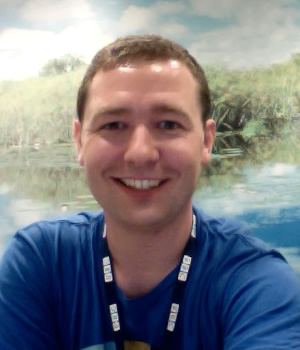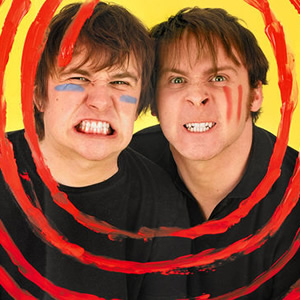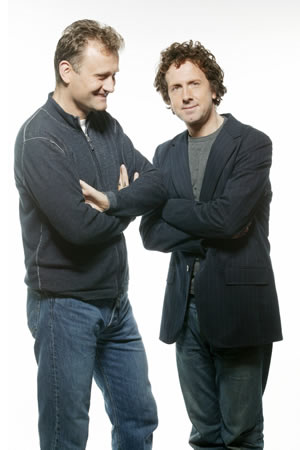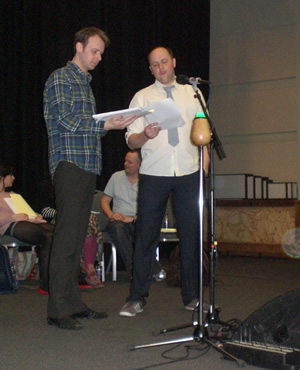Colin Anderson interview
Tuesday 3rd May 2011

Here's an interview with the BBC Radio 4 comedy producer Colin Anderson. His latest project is 49 Cedar Street...
Hi Colin. What's your background and why did you decide to go into comedy?
I was a typical comedy geek at school, got a job on the bar at The Frog and Bucket Comedy Club when I went to Manchester for university and moved from there into writing comedy reviews and sketches, running a comedy night at the Students' Union and then getting bits of production work at BBC North.
After making a lot of tea and formatting a lot of scripts I got a place on the BBC's Programme Making Trainee Scheme, which is a fast-track scheme for TV and radio producers.
I got into comedy because I'm a massive fan and the day-to-day job hasn't disappointed - I get to work with many of my comedy heroes and to scout and develop new writers and performers. It's fun work.
You've worked a lot with Mark Thomas, what is it about his comedy that you like?
This goes back to me as a 16 year-old comedy geek again. I remember The Mark Thomas Comedy Product being so exciting, really important comedy. Mark's a modern muckraker in the public service tradition of someone like H L Mencken.

So I was a big fan of Mark's comedy before I met him. Having worked with him, his intellect doesn't disappoint, he has an amazing commitment to whatever project he's working on. I think that we could all do with more of that kind of sense of mischief in our lives and working with Mark is a day-to-day adventure.
You also champion new comedy, like Laura Solon and Colin and Fergus (pictured). How do you find your new projects?
I see a lot of live comedy, listen to a lot of podcasts and read a lot of scripts. I first saw both Laura and Colin & Fergus at the Edinburgh Fringe and you can't beat 7-9 hours of comedy a day for spotting new stuff, but I've also made quite a few sketch shows and that's been a good way of discovering promising new writers.
What do you look for when seeing a new script or comedian for the first time?
That's really tough to say, because it's down to taste and that initial thing that grabs you about comedy is hard to define. I suppose crudely I'm looking for something that first makes me laugh and second has some original voice, possibly thirdly it needs to have enough competence for me not to have to nurse it for years before I can offer it to a commissioner, but I've waived that rule plenty of times in the past.

You produced 24 series of The Now Show. Why do you think it is so successful and has it changed since you first started it in 1998?
I didn't start it, that's just a mistake on Wikipedia. Bill Dare and, I think, Aled Evans started the show in 1998 and it was a totally different beast - much more of a variety show and with a larger cast - Al Murray and Matt Lucas were both regulars. I think Ashley Blaker then cut that show down into the shape of the modern-era Now Show and I got given it to produce in about 2004. I was a listener and fan before I joined Radio Comedy and still get Hugh to do "Milky milky" whenever the opportunity arises.
I think The Now Show is successful because it's in that satirical tradition of pointing up hypocrisy and unfairness; it allows us to laugh at our problems and does so in a very bite-sized, silly and accessible way. The longest we'd usually do on a single subject is about 6 minutes and then there will be a song or a stand-up segment and if you haven't read the papers that week, you'll probably still get all the jokes.
The regular team of Steve, Hugh, Mitch Benn, Laura Shavin, Marcus Brigstocke and Jon Holmes have fantastic chemistry. And as The Now Show's become a Radio 4 institution, we've been able to include more long-running characters, references and gags, which make the listening audience feel a part of The Now Show club.

What was it about 49 Cedar Street that made you want to produce it?
My discovery of Cedar Street was quite an odd one. I first saw it produced through the Sitcom Trials a couple of years ago, but was about to leave the BBC to work in America, so told my boss that I'd enjoyed it and she said that there was a producer from BBC 7 interested in developing it for radio, so I left it at that.
When I got back from the States I was sent a script by a writer whose name sounded familiar. It was brilliantly written, with great dialogue and funny jokes, but was set at a celebrity magazine, which I thought would be a turn-off for Radio 4. I emailed back saying that I'd loved the writing, but did she have any other ideas for situations, anything else she'd written? Back came Cedar Street which had been killed off in radio development while I'd been away.
What I liked about Cedar Street were the jokes, the Family Guy-style use of surreal cut-away sketches and the overall energy of the script. Julie Bower writes really punchy dialogue, which is pretty rare and any time I gave her notes she'd come back with a bunch of funny new ideas.
From the first read I was also excited about how I'd cast it, which is always a good sign. It felt like a really fresh new show and so should have a selection of fresh new performers. I think two of the final cast hadn't done radio before and none of the leads had done sitcom, plus we got a film composer in and had live on-stage sound effects, the whole project had a great energy!
What was the greatest mistake or failure you made and how has it helped you in the long term?
Wow, way to kill my buzz! I think my biggest production mistake has been trying to cut a show to time without being prepared to cut enough of the jokes and ending up with a show that literally needed more space to breathe. So breaths and silences are more important on radio than you might imagine and can be worth cutting jokes for.
A more writing-based lesson I've learned is that cast read-throughs can give you a false belief in how funny a joke is. So many times the piece of comedy gold, that's killed us all again and again in rehearsals, falls totally flat with the audience. It may be hubris, the performer delivering said line with too much swagger, or just that thing where comedy people find weird stuff funny that doesn't necessarily translate to the general public.
Conversely a really hack pull-back and reveal gag seldom fails to totally slay a studio audience. We all have a responsibility not to exploit that fact too much.
What three pieces of advice would you give to aspiring writers?
Write as much as you can and where possible get your stuff performed in front of an audience. That's the best way to hone your craft and build your own confidence.
Write for radio. It's a great writers' medium, you get to be more involved in the production than you would in TV and I think there are more opportunities for work. Open-door topical sketch shows like Newsjack are an excellent way to keep your writing muscles flexed and to hopefully pick-up a few quid along the way.
Quite a specific one this last one, drawn from experience: when sending spec scripts to a show hosted by Punt and Dennis, avoid having "Hale and Pace" visibly Tippexed-out at the top of each page...
...but do have your name and contact details for when the producer's printed out all the sketches and they're in "yes", "no" and "maybe" piles on his floor.
BCG Guide to '49 Cedar Street'
See also: Interview with '49 Cedar Street' writer Julie Bower

